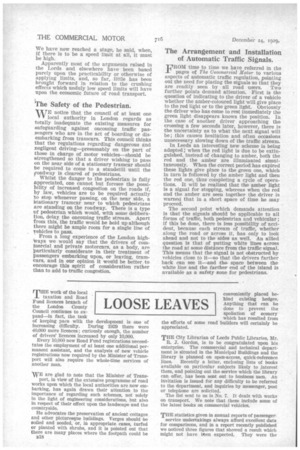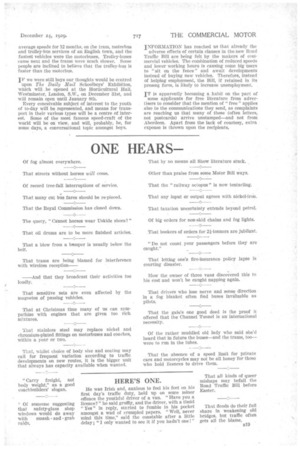T IELE work of the local taxation and Road Fund licences
Page 36

Page 37

If you've noticed an error in this article please click here to report it so we can fix it.
branch of the London County Council continues to expand—in fact, the task of keeping pace with the development is one of increasing difficulty. During 1929 there were 40,000 more licences; curiously enough, the number of drivers' licences increased by only 10,000.
Every 10,000 new Road Fund registrations necessitates the employment of at least one additional permanent assistant, and the analysis of new vehicle registrations now required by the Minister of Transport will also require the whole-time services of another man.
WE are glad to note that the Minister of Trans port, in view of the extensive programme of road works upon which the local authorities are now embarking, has again drawn their attention to the importance of regarding such schemes, not solely in the light of engineering considerations, but also in respect of their effect upon the landscape and the countryside.
He advocates the preservation of ancient cottages and other picturesque buildings. Verges should be soiled and seeded, or, in appropriate cases, turfed or planted with shrubs, and it is pointed out that there are many places where the footpath could be
B18 conveniently placed behind existing hedges. Anything that can be done to prevent the spoliation of scenery which has resulted from the efforts of some road builders will certainly be appreciated.
THE City Librarian of Leeds Public Libraries, Mr. R. T. Gordon, is to be congratulated upon his enterprise. The commercial and technical department is situated in the Municipal Buildings and the library is planned on open-access, quick-reference lines. Recently a letter, enclosing lists of books available on particular subjects likely to interest them, and pointing out the service which the library can offer, has been sent out to business men. An invitation is issued for any difficulty to be referred to the department, and inquiries by messenger, post or telephone are solicited.
The list sent to us is No. 7. It deals with works on transport. We note that these include some of the latest books on commercial vehicles.
THE statistics given in annual reports of passenger service undertakings always afford excellent data for comparisons, and in a report recently published we noticed three figures that showed a result which might not have ben expected. They were the average speeds for 12 months, on the tram, motorbus and trolley-bus services of an English town, and the fastest vehicles were the motorbuses. Trolley-buses came next and the trams were much slower. Some people are inclined to believe that the trolley-bus is faster than the motorbus.
IF we were still boys our thoughts would be centred upon The Daily Mail Schoolboys' Exhibition, Which will . be opened at the Horticultural Hall, Westminster, London, S.W., on December 31st, and will remain open until January 8th.
Every conceivable subject of interest to the youth of to-day will be represented, and means for transport in their various types will be a centre of interest. Some of the most famous speed-craft of the world will be on view, and will, probably, be, for some days, a conversational topic amongst boys. INFORMATION has reached us that already the adverse effects of certain clauses in the new Road Traffic Bill are being felt by the makers of coinmercial vehicles. The combination of reduced speeds and lower working hours is causing some big users to "sit on the fence" and await developments instead of buying new vehicles. Therefore, instead Of helping employment, the Bill, if retained in its present form, is likely to increase unemployment.
IT is apparently becoming a habit on the part of some applicants for free literature from advertisers to consider that the mention of " free " applies also to the communications they send, as complaints are reaching us that many of these (often letters, not postcards) arrive unsta,mped—and not from Aberdeen. Apart from the lack of courtesy, extra expense is thrown upon the recipients.




































































































